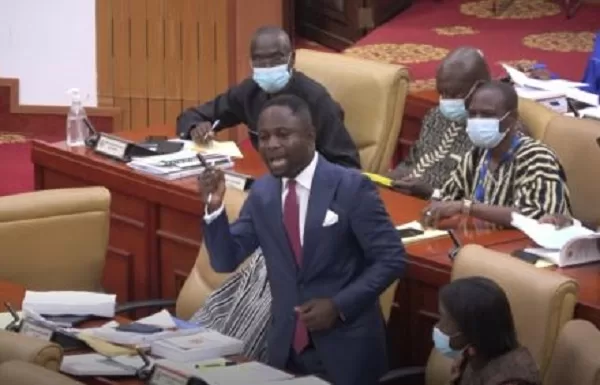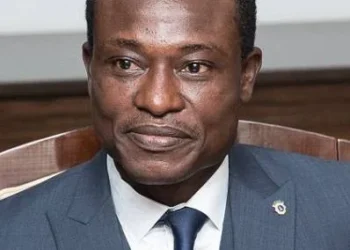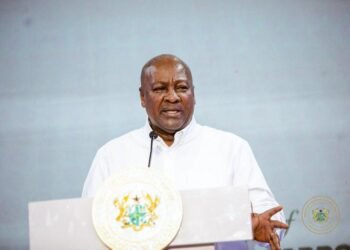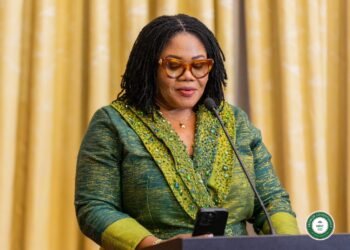The Minister of Health, Hon. Kwabena Mintah Akandoh, recently briefed Parliament on the health challenges facing Ghana, specifically the outbreak of cerebrospinal meningitis (CSM) in the Upper West Region and cholera in some parts of the country.
In his address, the Minister provided an overview of the current situation, the measures taken to mitigate the outbreaks, and the ongoing efforts to ensure public health safety.
“During the dry season, the Meningitis Belt experiences seasonal outbreaks, often referred to as the meningitis season. In Ghana, this season extends from October to March.”
Hon. Kwabena Mintah Akandoh Minister of Health
He further explained that several pathogens can cause meningitis, including viruses and bacteria, with two main bacterial strains—Neisseria and Streptococcus—responsible for outbreaks in Ghana.
“Vaccination does not apply to Streptococcus, which is the strain currently causing havoc in the Upper West Region. This means that currently, vaccination is not one of the measures we can use to control the ongoing outbreak.”
Hon. Kwabena Mintah Akandoh Minister of Health
The Minister expressed grave concern over the ongoing outbreak in the Upper West Region. As of February 16, 2025, the region had recorded over 129 cases, with 16 deaths and 29 people still receiving treatment. The most affected districts include Wa Municipal, Nandom, Wa West, Daffiama-Bussie-Issa, and Nadoli. Despite the alarming numbers, Hon. Akandoh assured Parliament that the Ministry of Health had made substantial progress in containing the outbreak.
“Already, a wave of improvement is evident in the Upper West Region, where new meningitis cases are decreasing. This positive change follows the Ministry of Health’s swift and decisive actions.”
Hon. Kwabena Mintah Akandoh Minister of Health
Measures Taken
The Minister outlined several strategic interventions aimed at managing the outbreak effectively. These include;
Deployment of Experts; A team of national-level experts was dispatched to support regional and district health teams.
Free Treatment; The government ensured that all affected individuals received free medical treatment.

Emergency Operations Center Activation; National and regional emergency centers were activated to coordinate the response.
Coordination with WHO; Weekly meetings with experts from the World Health Organization (WHO) were held to align response strategies with international best practices.
Antibiotics Mobilization; Additional antibiotics were secured, including 10,000 vials of Ceftriaxone, to prevent medicine shortages.
Public Awareness Campaigns; Nationwide education efforts were launched to encourage early reporting of symptoms.
Community Engagement; Traditional leaders and local authorities were involved in sensitization efforts.
High-Level Visits; The Minister, alongside the Director-General of the Ghana Health Service, visited affected areas to assess the situation firsthand.
Cholera Outbreak and Response
The Minister also updated Parliament on cholera outbreaks in parts of the country. He assured the house that surveillance systems were in place to monitor and control the disease.
“Mr. Speaker, I want to assure the house that the risk of cholera in Ghana remains low. We have robust surveillance systems in place to monitor outbreaks.”
Hon. Kwabena Mintah Akandoh Minister of Health

He called on municipal and district assemblies, along with local authorities, to enforce bylaws ensuring access to safe water and food. The Minister informed Parliament of the detection of a single case of Human Metapneumovirus (HMPV), a respiratory virus that affects individuals with weakened immune systems. The Ministry began testing for HMPV in January 2025 after reports of increased respiratory cases in China.
“So far, a total of 90 samples have been tested, with only one positive case detected in an elderly patient.”
Hon. Kwabena Mintah Akandoh Minister of Health
He assured Parliament that Ghana’s strengthened post-COVID-19 surveillance system would quickly detect and manage any emerging cases.
Hon. Akandoh urged all stakeholders, including Members of Parliament, municipal assemblies, and media houses, to support public education efforts on meningitis and cholera prevention. He also acknowledged contributions from Parliamentarians in the fight against the outbreaks.
“Mr. Speaker, the Right Honorable Speaker has made significant donations to the Upper West Region in the fight against meningitis. Similarly, the Minority Leader, Hon. Ato Forson, has also contributed to the fight against cholera in Effutu. Mr. Speaker, we are doing everything in our power to contain these outbreaks and safeguard the health of our nation. We will continue to monitor the situation closely and provide regular updates to Parliament and the public.”
Hon. Kwabena Mintah Akandoh Minister of Health
With the outlined interventions and collaborative efforts of stakeholders, the Ministry remains resolute in addressing these public health challenges effectively.
READ ALSO; Prof. Asare Demands End to “Midnight Appointments” Chaos






















